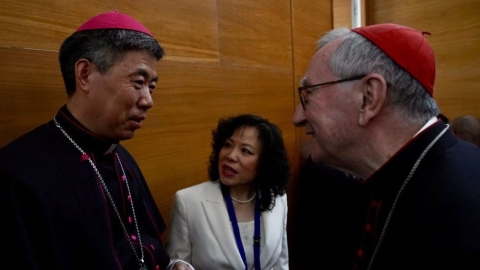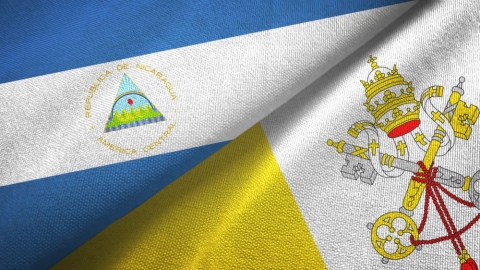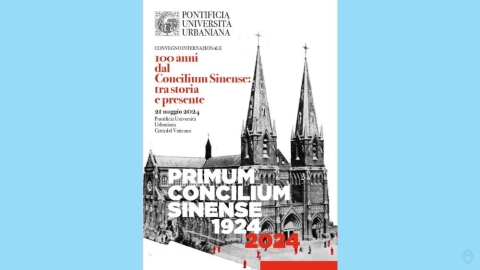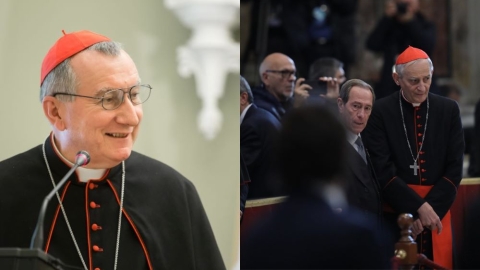Is the Catholic Church on the Brink of a Schism?

On June 4, Professor Roberto de Mattei, of the European University of Rome, gave an important conference entitled “Is the Catholic Church on the Brink of a Schism?” The French translation of this conference was published in full in the latest edition of Courrier de Rome, whose director we thank for authorizing us to publish the following extracts. – The subtitles have been added by DICI.
A Provocative Question?
Is the Catholic Church on the brink of a schism? This question may seem excessive, untimely, provocative. But people are talking about it. Not only under their breath, but even out loud. A well-known and appreciated Spanish priest, Fr. Santiago Martin, has given a conference on the matter, with a special reference to the Kasper case, the cardinal who during the extraordinary Consistory on February 20 raised the question of communion being granted to remarried divorcees. (…)
In the (present) situation of an objective weakening of the papacy, it is neither a provocation nor a scandal to evoke the possibility of a schism. It is the logical conclusion of an attentive observer of the history of the Church, and of the faithful who in the times of crisis do not renounce the use of the highest faculty God has given us: reason.
The goal of our conference is to offer rational elements that help us to orient ourselves, not as theologians, but simply as baptized faithful, as simple faithful who wish to understand what is happening, because what is happening concerns them, concerns us. (…)
What Is a Schism?
The Church, using the instruments of her law, Canon Law, determines the existence of a schism or a heresy and takes the measures indicated. One of these measures is excommunication, a censorship by which the baptized person is excluded from the communion of the faithful, separated, so to speak, from the body of the Church. The excommunicated person is formally excluded from the sacraments from the moment the excommunication is pronounced, but he is in fact schismatic and/or a heretic from the moment he separates himself from the authority or the faith of the Church. Excommunication testifies to the existence of a schism, it ratifies a separation from the Church that occurred the moment the subject committed the act.
Let us take an example. The bishop of Innsbruck, Manfred Scheuer, mandated by the Congregation for the Doctrine of the Faith, excommunicated Martha Heizer, president and foundress of the movement We are the Church, along with her husband Ehemann Gert, because they had been celebrating Mass in their house in Absam, in the diocese of Innsbruck, for three years with other persons of the community and without a priest. It was an imitation, a parody of the Mass, that consequently fell under the blow of an excommunication latae sententiae, that is, an automatic excommunication that was notified by the bishop in May 2014, but that actually began the moment Martha Heizer started behaving in a way that went against the doctrine and praxis of the Church. So Heizer, her husband and their companions have been in a state of schism for years now.
Heizer is not an isolated and extravagant person; she founded in 1995 a movement that has spread beyond the boundaries of the German language and counts tens of thousands of supporters. We are the Church, Wir sind Kirche, proposes radical reforms in the Catholic Church: the democratic election of bishops, the ordination of women, the abolition of priestly celibacy, an end to the discrimination against homosexuals, communion for remarried divorcees, a new sexual morality: in a word, the secularization of the Church that they consider to be a positive contribution of Vatican Council II. Today this movement is on the decline, but its ideas, or at least some of them, have penetrated the German and Austrian Church. An excommunication by the bishop of Innsbruck was a necessary act in the face of such crude acts as the Mass being celebrated for three years by a woman of his diocese. But what can we say of all these priests who, in Austria and Germany, inspired by the same ideas, live with a woman, give communion to remarried divorcees, and bless homosexual pseudo-marriages; and what can we think even more generally of all these priests and laymen who share and put into practice all or some of the ideas of We are the Church? There are thousands of people in all of Europe who are living in a state of objective schism. (…)
A State of Objective Schism
We know that a Bishops’ Synod is being prepared. It will be held in two steps: the extraordinary general assembly from October 15 to 19, on the theme The pastoral challenges of the family in the context of evangelization, with the goal of “gathering testimonies and proposals”, and the ordinary General Assembly in 2015, to “find operational lines for the pastoral care of the individual and the family.”
In view of this Synod, a “Preparatory Questionnaire” was sent to dioceses of the whole world; and we know at least some of the answers.
On February 3, the German Bishops’ Conference published a resume of the answers sent by the 27 German dioceses and archdioceses, and by about 20 Catholic associations and institutions[1]. (…) The conclusion of the resume: “the language of the Church and the authoritative nature of all its official communications certainly do not help to stir up and find the comprehension and consent of the faithful” (p. 163). The German bishops state that “we must go beyond the morality of interdictions and consider blessings for unions in deed, even if they are distinct from the celebration of the sacraments” (p. 172). “The answers from the dioceses allow us to see just how great is the distance between the baptized faithful and the official doctrine, especially as far as living together before marriage, birth control and homosexuality are concerned” (p. 172). (…)
What do the German, Austrian and Swiss bishops propose to the Synod? They propose to “go beyond the morality of interdictions” and to fill up “the distance between the baptized faithful and the official doctrine”, by adapting the pastoral praxis of the Church to the concrete requirements of the Catholics of their dioceses. But most of the German, Austrian and Swiss Catholics, if we consider the answers to the questionnaire, are in fact in a state of schism as far as the moral behavior required of baptized Catholics is concerned. Indeed, whoever lives a stable sexual union outside of marriage, while continuing to receive the sacraments, is not only in a state of sin, but of separation from the traditional praxis of the Church, and therefore in a condition of objective schism, even if it is not declared.
If the German bishops formally denied the validity of the 6th and 9th commandments, they would fall ipso facto into heresy. They do not deny the doctrine, but they propose to modify the pastoral praxis. And they do so in the name of Vatican Council II that confirmed the primacy of the pastoral practice over the doctrine. But if the praxis contradicts the doctrine, if it has an inexorable impact upon it, it will produce an alteration; it will transform it, not dogmatically, from above, but by practice, from below.
Cardinal Kasper’s Report
That is what Cardinal Kasper proposed in his introductory report for the extraordinary Consistory on the family on February 20[2]. (…) All the cardinals do not share Cardinal Kasper’s ideas. Some criticized him and will continue to do so with apostolic firmness[3]. But these ideas are now a part of the Church’s internal dialectic, that seems to be reduced to a sort of parliament of different opinions.
From this point of view, Kasper has already won his battle. The simple fact that by opening the Consistory of Cardinals, which is the supreme consultant organ of the Church, with his report, and that while speaking in the name of the pope, he was allowed to expose his theory, is an extraordinary victory for his side. Even if his position must remain a minority for the time being, a large mass of Catholics will draw from it a pretext for persisting in a way of living that abandons the Church’s tradition of life, and immerse themselves in the secular world of our times. Opposing this process of secularization implies converting society. Either the Church changes the world or the world changes the Church. Either the Church converts the world or the world secularizes the Church.
The Church, that is growing more worldly, is being secularized, that is, she is losing her inherent sacredness. But if Christianity bows to secularism, it must relegate its supernatural dimension to the background, and it loses its soul and its identity. It becomes something else, separated from itself, and this split is properly speaking a schism.
From a Latent Schism to an Open Schism
Let us answer the question with which we began: are we on the brink of a schism in the Church?
My answer is: we are not on the brink of a schism: we are in the schism; we are plunged in schism, because the Church is torn, broken not into two sides, but into a plurality of different and divergent currents. It is enough to think of this Church within the Church, the “neocatechumenals”, with a liturgy that is technically schismatic, because it is separate from the ordinary and extraordinary rite of the Catholic Church.
Within the one Church, different and opposing ideas and praxes are now living together. The schism has not yet become formal, but schisms and heresies, even when they are not notified and not even official, are nonetheless real. This latent, rampant, but real schism is bound to explode sooner or later in all its violence. The idea of avoiding it by placing opposing currents, from We are the Church to the Society of St. Pius X, in one “box” is an illusion, for two religions cannot live together in one ecclesial body. (…)
But we know that, precisely because the Church is a visible institution, we must always make the distinction between the Church and the men of the Church: the Church is always visible, infallible and indefectible, immaculate in faith and in morals; the men of the Church are not all and are not always impeccable or infallible. Even the pope can be respectfully criticized. The pope is not Christ, nor His successor: he is His Vicar, but it is Jesus Christ who holds and governs the Church. (…)
(Translated from the Italian – Source: Courrier de Rome – DICI no.298 dated July 4, 2014)
The full text of the French translation of Professor de Mattei’s conference is available at Courrier de Rome B.P. 10156 – F-78001 Versailles Cedex – Fax: 00 33 (0)1 49 62 85 91 – Email: [email protected] - 3€/edition; subscription 20€/year (Switzerland: CHF 40, Foreign: 24€).
[1] Réponse au questionnaire sur la famille, “Il Regno-Documenti”, 5 (2014), pp. 162-172.
[2] After being announced by “Il Foglio” on March 1, Cardinal Kasper’s text has now been published in Il Vangelo della famiglia (The Gospel of the Family), Queriniana, Brescia 2014.
[3] See for example Cardinal Velasio de Paolis’ report to the Ecclesiastic Tribunal of Umbria on March 27, 2014: www.tribunaleecclesiasticoumbro.it
You can also read :
A Split in the Church
Europe: The Progressivist Schism Grows Less and Less Latent
A hint of schism





